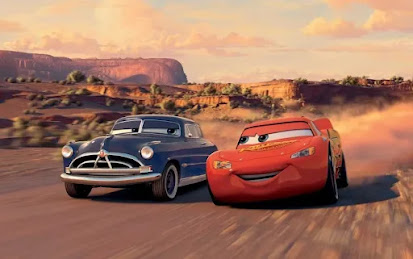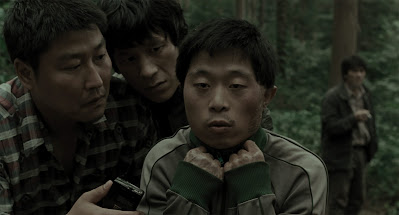Repost: Doom Patrol and Body Horror
This post was originally posted on my old, now defunct blog, on May 17, 2019. I have done some editing to it but, for the most part, is the same post.
A father lay dying and gave his son, a woodcutter, the family ancestral ax. The father made the woodcutter promise that he would always use the ax in his trade.
During the next season, the ax blade, old as it was, snapped in half on a stubborn tree. Being a dutiful son, the woodcutter had it replaced by the best metalsmith.
During the next season, the wooden handle began to fall apart from age. Being a dutiful son, the woodcutter had it replaced by the best woodworker.
During the next season, admiring the new blade and new handle, the woodcutter wondered if in dutifully executing his promise to his father, he had inadvertently broken the same promise.
Is it the same ax? Just like the Ship of Theseus, the question of fidelity of identity lingers. Is the intent enough to call it the same ax when the sum of the whole have all been replaced? It's also a question that lingers from the shadows during the first season of DC Universe's Doom Patrol. How far do you have to push and stretch something before it's no longer the same as it once was?
Now what if the thing that is getting pushed and stretched once was a human being? That's where you start dipping your toe into the realm of body horror. Body horror is one of those cinematic topics that is very polarizing but that I find absolutely fascinating. To put a definition to it, body horror focuses on "graphic or psychologically disturbing violations of the human body" - and not just slasher style horror. A big division between basic slasher and the realm of body horror is the transformative element of the changes in a human (and more importantly the flesh) through the horror. This is an area of interest that Cronenberg is infamous for playing around in and a great example of the transformative is looking at his remake of The Fly. Like genius and madness the difference between the monstrous and the Next is a thin fleshy line that body horror relishes in investigating closely.
 |
| Cyborg didn't ask for this. |
But back to Doom Patrol. In the show, there are four freaks salvaged from the grips of their respective ruin by Niles Caulder, The Chief, played wonderfully by Timothy Dalton and I am so grateful to be here for the Dalton revival. In the spirit of the source material, he brings them together to form a superhero team of the "World's Strangest Heroes" whose powers are less a boon and more are a cause of "alienation and trauma." Each one has drastically undergone either physical or psychological changes on a horrific scale. The characters with whom we’re introduced to the world is Cliff Steele, a deceased race car driver whose brain was placed in a robot body to preserve it (voiced pitch perfectly by Brendan Fraser - another revival I'm more than grateful to see - and acted perfectly by Riley Shanahan); Rita Farr, a 50s Hollywood star who came across some unknown substance in the African jungles during a movie filming and now doesn't have complete control of her body (performed by April Bowlby); Larry Trainor, an experimental Air Force pilot who flew through a radioactive cloud and came into contact with an interdimensional being that now shares his body, after giving him incredible burns all over his body (also with a duo performance voiced by Matt Bomer and performed by Matthew Zuk); Crazy Jane, a woman suffering from 64 unique personalities, each one with its own unique superpower (doing an impressive amount of work with doing different performances for each personality is Diane Cuerrero); and Victor Stone, none other than the Justice League's own Cyborg (performed by Joivan Wade).
Each character wrestles with their own identity with their physical traits in their own layered way through the course of the first season, but it's actually Cyborg's that stirred interest in writing this article. The rest of this article delves into spoilers for season one of the show, so if you haven't seen it yet, you may want to skip.
In the first half of the season, the good guys were confronted with an omniscient and omnipotent villain, Mr. Nobody (played by the incomparable Alan Tudyk), who messed with each of their heads in some way to knock them off their game. Cyborg was given a vision that he would lose control to the machine within him and go on a murderous rampage. This made Victor question if he could prevent that... and if he even had control over his own body to begin with.
This was followed over the season with the Grid, the operating system running in Cyborg, allegedly running rampant with commands not given by Cyborg himself. This developed a distrustful wedge between Cyborg and his father, Victor's savior but also author of the Grid (played by Phil Morris). A fear took hold in Victor that the machine side of him might have been taking over. Grid began to act invasively, forcing Victor to make the decision to deactivate Grid. He hoped to gain some autonomy over his own body.
We further learn that when Cyborg is injured he has nanites inside him that replicate more machinery when necessary (if the injury is too traumatic to heal on its own). He began to fear that Grid approved of replicating more machinery without injury, slowly taking over inside of him. To examine the veracity of that fear, Cyborg did the only thing he thought he could do: he literally cut his arm open, poking around for visual confirmation.
It's that moment why I may have realized why I am attracted to body horror and the question of is the ax the same ax. I have a fascination in transhumanism and where it intersects into body horror. Primarily, when you start replacing physical elements, when are you no longer you? When are you no longer human? Cyborg's fear of losing his humanity when Grid allegedly began replacing his human side with machinery is instilled in that same fear.
 |
| Poor Cliff didn't ask for this either. |
The question of autonomy of these changes is also what makes this dangle its feet in the realm of body horror. Neither Victor nor Cliff asked for - or frankly wanted - these changes. They were both the results of life-saving and irreversible experiments. The show plays around a lot and has some fun exploring the question of humanity, specifically with some of the most emotionally and spiritually human but physically inhumane individuals. It's a great watch with a fun sense of humor. I'm more than a little bummed the fourth season is the final season but it's been a fun ride.



Comments
Post a Comment